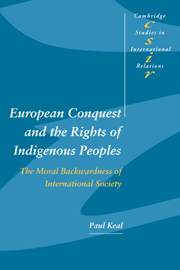 European Conquest and the Rights of Indigenous Peoples
European Conquest and the Rights of Indigenous Peoples Book contents
- Frontmatter
- Contents
- Acknowledgements
- Introduction
- 1 Bringing ‘peoples’ into international society
- 2 Wild ‘men’ and other tales
- 3 Dispossession and the purposes of international law
- 4 Recovering rights: land, self-determination and sovereignty
- 5 The political and moral legacy of conquest
- 6 Dealing with difference
- Conclusion
- Appendix
- Select bibliography
- Index
- CAMBRIDGE STUDIES IN INTERNATIONAL RELATIONS
6 - Dealing with difference
Published online by Cambridge University Press: 03 December 2009
- Frontmatter
- Contents
- Acknowledgements
- Introduction
- 1 Bringing ‘peoples’ into international society
- 2 Wild ‘men’ and other tales
- 3 Dispossession and the purposes of international law
- 4 Recovering rights: land, self-determination and sovereignty
- 5 The political and moral legacy of conquest
- 6 Dealing with difference
- Conclusion
- Appendix
- Select bibliography
- Index
- CAMBRIDGE STUDIES IN INTERNATIONAL RELATIONS
Summary
The changing representations of indigenous peoples in international law discussed earlier reflect the evolution of European political theory. Prior to the establishment of a distinct positive international law, legal, political and moral reasoning were not separated into the distinct discourses they are more often than not assumed to be in contemporary theory and practice. As the example of Vattel writing Locke's ideas on property into international law showed, there was an important cross-fertilisation of ideas between political and legal writing. The two realms of thought were in many respects mutually constitutive, just as international law and international society have been. Preceding chapters have also shown that in European encounters with non-Europeans, difference and cultural incommensurability were important factors in shaping political and legal thought and in turn in denying the rights of indigenous peoples. Political and legal thought asserted the superiority of European culture and served to justify the dispossession of non-Europeans. As a whole, the study has been concerned to give indigenous peoples a more prominent place in the intellectual history of international society and this necessarily involves having to think about the impact cultural difference has on relationships both within states and across borders. This is not to say that culture has been neglected entirely by those concerned with understanding international society.
In an article that relates Martin Wight's three traditions of thought about international relations to understanding the nature of the European encounter with the ‘first Australians’, Timothy Dunne claims that ‘certain thinkers … associated with the “English School” have not neglected questions of culture and identity’.
- Type
- Chapter
- Information
- European Conquest and the Rights of Indigenous PeoplesThe Moral Backwardness of International Society, pp. 185 - 216Publisher: Cambridge University PressPrint publication year: 2003
